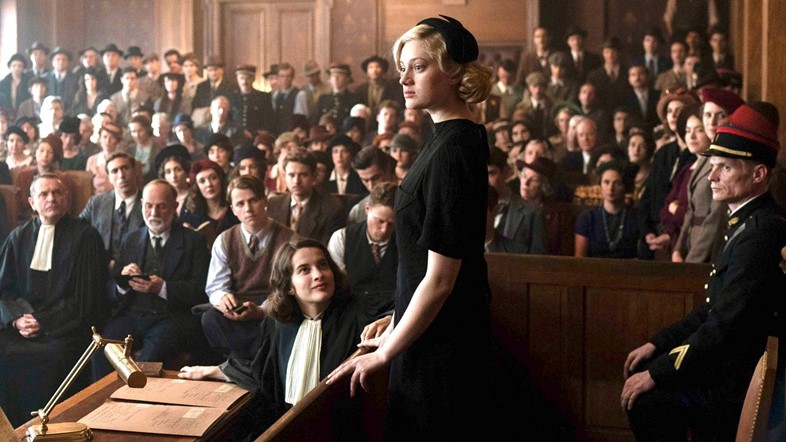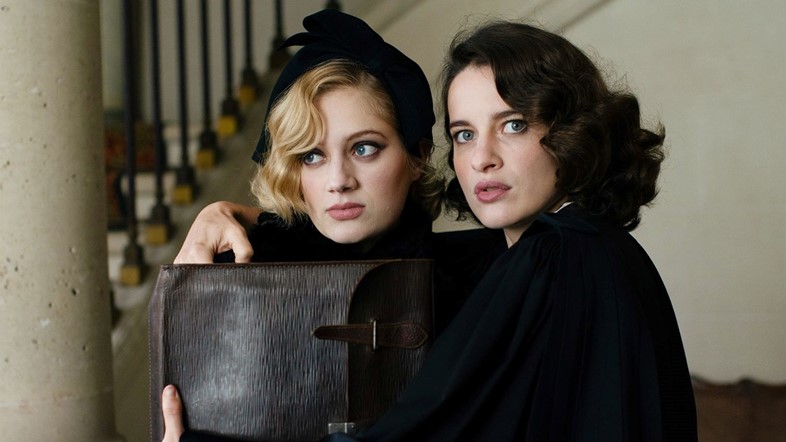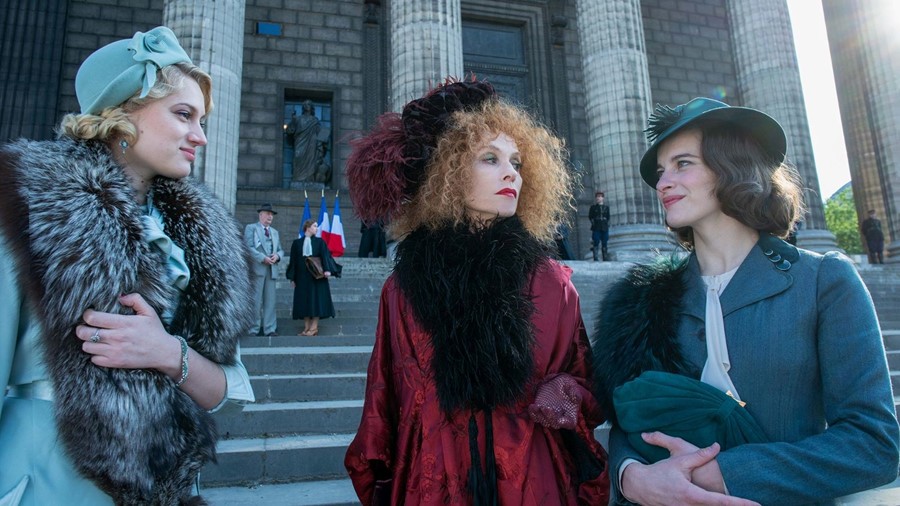François Ozon’s first-ever period film stars Isabelle Huppert in riotous comedic mode. “She’s beautiful, of course, but she can be very, very funny,” he says
“It’s like when I was a child playing with a doll’s house,” says French director François Ozon, on his experience making a period film. The only difference is that “my dolls speak a lot”. In the case of the prolific director’s new 1930s-set film The Crime is Mine, his formidable dolls happen to include Isabelle Huppert in riotous comedic mode, alongside next-gen stars Rebecca Marder and Nadia Tereszkiewicz. The latter play young girls navigating sexism and poverty in a sumptuous art deco Paris, while Huppert is a past-it silent film star in Norma Desmond mode who nevertheless shares their problems.
“It’s very strange because I realise each time I make a comedy, I want women for the lead parts,” says Ozon, who is well-known for writing brilliant roles for women of all ages across a kaleidoscope of genres. The film begins with penniless actress Madeleine (Tereszkiewicz) hurrying from the home of a lecherous theatre producer. Later, we learn that the producer has been shot, and that Madeleine, whom the old lecher had tried to assault earlier that day, is the prime suspect. Cue a screwball trial, in which innocent Madeleine falsely takes the blame for the murder and gives a barnstorming monologue, scripted by sidekick Pauline (Marder), on the impossibility of being a woman in a man’s world. Once acquitted, Madeleine is the toast of the town, being handed starring roles on stage and screen until the real murderer, a flamboyantly coiffed Huppert, arrives wanting a piece of the action.
The roots of Ozon’s film come from an old French play from the 1930s, adapted twice for Hollywood. But, he says, “I wanted to go back to the original because it was the link between the two girls that interested me.” With the focus on the camaraderie between Madeleine and Pauline, The Crime is Mine completes a trio of period films devoted to women that Ozon semi-consciously started more than 20 years ago. The trilogy began with his radically camp 2002 musical 8 Women, featuring almost every iconic French actress of the last half century, followed in 2010 by the comedy Potiche.
“I start with a cliche about women, and I try to show something else at the end,” says Ozon of these films. “With 8 Women, it was this cliche about the catfight, and at the end, you realise all these women are [in it] together. In Potiche, [Catherine Deneuve] is a trophy wife, but at the end she wins the power. And this time, I wanted to show the sisterhood and how it’s important for women to fight together – especially in the 30s, which was a very patriarchal period.”
Filled with echoes of other films, The Crime is Mine is a self-aware caper that can be read as a fantasy riposte to the miserable plight of women at the time – and right now. Nods to Violette Nozière, the notorious killer played by Isabelle Huppert in Claude Chabrol’s 1978 film, as well as to the murderous Papin sisters, who inspired Jean Genet’s The Maids, speak to the true-crime scandals of the time. (“In the 30s, people realised women could be monsters and murderers, too,” says Ozon.) There are also several references to 30s star Danielle Darrieux, who was one of the eight women in Ozon’s beloved 2002 film, and who passed away in 2017 aged 100. “She was the big star in France – everybody loved Danielle Darrieux at the time,” says Ozon.

Arguably the ‘big star’ in France right now is Huppert, who was also one of Ozon’s titular eight women back in 2002, playing Catherine Deneuve’s neurotic spinster sister who undergoes a glamorous, third-act makeover. The Crime is Mine marks the director’s second collaboration with Huppert after a gap of more than two decades. “She’s afraid of nothing,” enthuses Ozon. “She can play everything. When I sent her the script, she loved the story, but she said, ‘I arrive very late in the story, is it not possible to arrive a little bit before?’ I said, ‘No, but don’t worry, Isabelle, when you do get there, everybody will look at you.’”
And it’s true that while the younger actresses more than hold their own, Huppert can’t help but be the film’s crackling centre of gravity as one-time silent film star Odette Chaumette. “She has a lot of humour about herself. You know, she’s not the ‘grande dame of cinéma Française’, she can be very funny,” continues Ozon. “And I realised, each time I make a film with her, it’s a comedy. She’s been in big dramas and very dark movies, but I love her in comedy. She has a rhythm; she’s beautiful, of course, but she can be very, very funny.”

The fondness goes both ways. “He always sees me as an extravagant character, talking very fast,” said Huppert of their collaboration last year. This time, “It was different, but a bit the same: the same exaggeration, demands, the same composition, something very far from me. And I had a great time.”
Unlike the fraught relations depicted in his latest film, Ozon knows how to build rewarding relationships with his leads. Over more than 20 films, he has collaborated with some of the biggest names in French cinema – from Deneuve and Huppert to Isabelle Adjani, Emmanuelle Béart and Emmanuelle Seigner, and even the late Jeanne Moreau.
“I think you have to love the people you film,” he says. “You have to adapt yourself to each actor or actress, [because] they don’t have the same needs. I realised that when I made 8 Women, because I had in front of me eight stars, and I had to adapt to Catherine Deneuve, Isabelle Huppert and Fanny Ardant. It was a nightmare!” But, he says, with characteristic magnanimity, “You have to give to each.”
The Crime is Mine is in UK cinemas on October 18.
